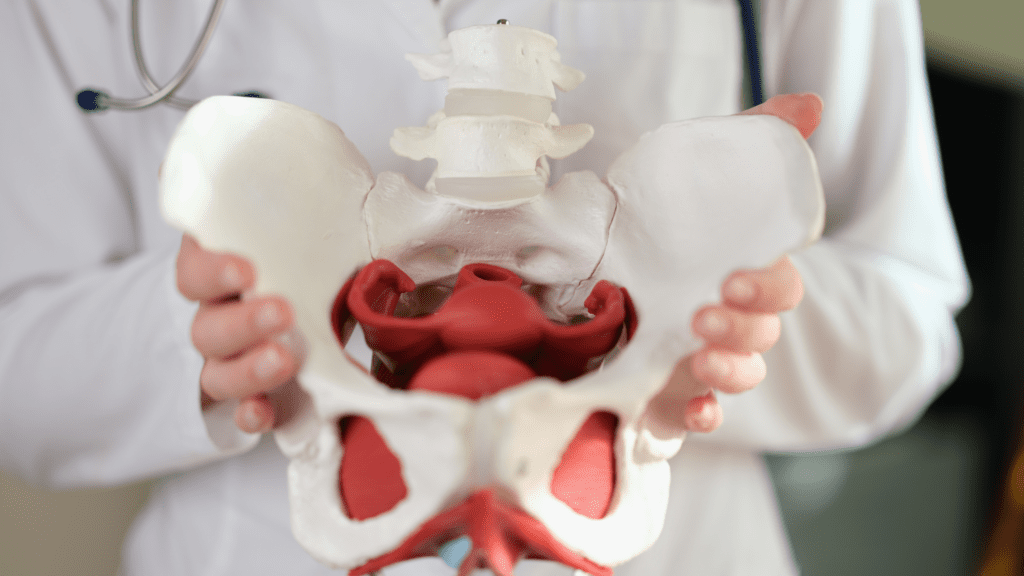An inguinal hernia occurs when a part of the intestine or fatty tissue pushes through a weak spot in the lower abdominal wall or groin area. It forms a bulge that can be felt or seen under the skin. Inguinal hernias are more common in men but can affect women as well.
Detailed Information
Inguinal hernias develop due to a combination of pressure and a weakness or opening in the abdominal wall. Common causes include:
• Increased pressure: Straining during heavy lifting, chronic coughing, constipation, or urination can increase pressure on the abdominal wall and lead to a hernia.
• Weak abdominal muscles: Some individuals may have a natural weakness in the abdominal wall, which makes them more susceptible to hernias.
• Age: As people age, their muscles weaken, and the risk of hernias increases.
• Obesity: Extra weight can put added pressure on the abdomen, increasing the risk of a hernia.
• Family history: A genetic predisposition to hernias can increase the likelihood of developing one.
• Previous surgeries: Past abdominal surgeries can leave scars or weak areas that are more prone to hernias.
• Increased pressure: Straining during heavy lifting, chronic coughing, constipation, or urination can increase pressure on the abdominal wall and lead to a hernia.
• Weak abdominal muscles: Some individuals may have a natural weakness in the abdominal wall, which makes them more susceptible to hernias.
• Age: As people age, their muscles weaken, and the risk of hernias increases.
• Obesity: Extra weight can put added pressure on the abdomen, increasing the risk of a hernia.
• Family history: A genetic predisposition to hernias can increase the likelihood of developing one.
• Previous surgeries: Past abdominal surgeries can leave scars or weak areas that are more prone to hernias.
• A visible or palpable bulge in the groin or scrotum that becomes more prominent when standing, coughing, or lifting heavy objects.
• Pain or discomfort in the groin area, especially when bending over, coughing, or lifting.
• A feeling of heaviness or pressure in the groin.
• In severe cases, nausea, vomiting, and inability to pass gas or stool may indicate a strangulated hernia, which is a medical emergency.
• Pain or discomfort in the groin area, especially when bending over, coughing, or lifting.
• A feeling of heaviness or pressure in the groin.
• In severe cases, nausea, vomiting, and inability to pass gas or stool may indicate a strangulated hernia, which is a medical emergency.
While inguinal hernias cannot always be prevented, the following steps can reduce the risk:
• Maintain a healthy weight: Reducing excess weight can help minimize pressure on the abdominal wall.
• Practice safe lifting: Use proper techniques when lifting heavy objects to avoid straining the abdominal muscles.
• Avoid constipation: Eat a high-fiber diet and stay hydrated to prevent constipation, which can cause straining during bowel movements.
• Quit smoking: Smoking weakens the tissues in the abdominal wall and increases the risk of hernias.
Treatment for an inguinal hernia generally involves surgery, especially if the hernia is causing pain, increasing in size, or leading to complications:
• Open hernia repair (herniorrhaphy): The surgeon makes an incision in the groin to push the bulging tissue back into place and repair the abdominal wall with stitches or mesh.
• Laparoscopic hernia repair: A minimally invasive technique where the surgeon uses small incisions and a camera to repair the hernia with mesh.
• Watchful waiting: In some cases where the hernia is small and not causing symptoms, doctors may recommend monitoring the condition instead of immediate surgery.
• Open hernia repair (herniorrhaphy): The surgeon makes an incision in the groin to push the bulging tissue back into place and repair the abdominal wall with stitches or mesh.
• Laparoscopic hernia repair: A minimally invasive technique where the surgeon uses small incisions and a camera to repair the hernia with mesh.
• Watchful waiting: In some cases where the hernia is small and not causing symptoms, doctors may recommend monitoring the condition instead of immediate surgery.
Book Your Consultation Now
Schedule an appointment with the leading uro-oncologist in Bangalore, Dr. Anil
Kumar T. Benefit from expert care and advanced treatment options for all your
urological needs, delivered with a patient-centered approach.

Book Your Consultation Now
Schedule an appointment with the leading uro-oncologist in Bangalore, Dr. Anil
Kumar T. Benefit from expert care and advanced treatment options for all your
urological needs, delivered with a patient-centered approach.
Resolve Your Queries
Answers to the most common inquiries about urological conditions, treatments, and patient care. Designed to offer quick guidance and help you better understand, ensuring you feel informed and confident in your healthcare decisions.
Still have queries about Urology & Uro Oncology? Hit the button below.
Lorem ipsum dolor sit amet, consectetur adipiscing elit. Ut elit tellus, luctus nec ullamcorper mattis, pulvinar dapibus leo.
Lorem ipsum dolor sit amet, consectetur adipiscing elit. Ut elit tellus, luctus nec ullamcorper mattis, pulvinar dapibus leo.
Lorem ipsum dolor sit amet, consectetur adipiscing elit. Ut elit tellus, luctus nec ullamcorper mattis, pulvinar dapibus leo.
Lorem ipsum dolor sit amet, consectetur adipiscing elit. Ut elit tellus, luctus nec ullamcorper mattis, pulvinar dapibus leo.
Lorem ipsum dolor sit amet, consectetur adipiscing elit. Ut elit tellus, luctus nec ullamcorper mattis, pulvinar dapibus leo.
Lorem ipsum dolor sit amet, consectetur adipiscing elit. Ut elit tellus, luctus nec ullamcorper mattis, pulvinar dapibus leo.
Visit Us
Zymus Hospital Address
No.1, K NO. 92, Nanjappa Complex, Kanakapura Rd, Raghuvanahalli, Bangalore City Municipal Corporation Layout, Bengaluru, Karnataka 560062
Menu
Menu
Quick Links
Menu
Copyright © 2024. Dr Anil Kumar T


